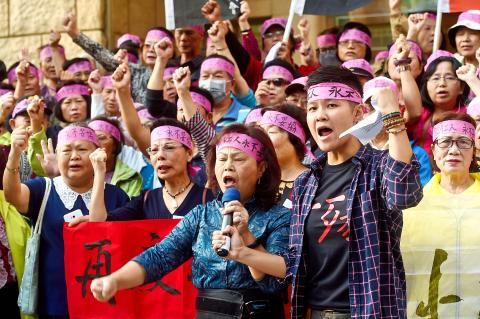The Taiwan High Court yesterday upheld a verdict ordering Radio Corp of America (RCA) and its affiliates to pay NT$718.4 million (US$23.7 million) to its former Taiwanese employees and their families.
Yesterday’s ruling increased the compensation from NT$564.45 million in the first ruling in 2015, with stakeholders closely watching the court’s decision in one of the nation’s longest-running legal battles between a major corporation and workers.
RCA, which operated several production plants in Taiwan from 1970 to 1992, was in 1986 taken over by General Electric Co (GE), which later sold it to Thomson Consumer Electronics, the US subsidiary of France-based Thomson Multimedia, which is now called Technicolor SA.

Photo: Chien Jung-fong, Taipei Times
The court included GE, Technicolor and Thomson as defendants, ordering them, along with RCA, to pay compensation to 486 former employees.
In the first ruling, the judges wrote that they were unable to determine whether RCA was a subsidiary of GE, based on RCA’s business registration, and omitted GE as a responsible party.
However, an investigation found that GE took over RCA before selling it to Thomson, which took ownership of an RCA production plant in then-Taoyuan County.
The judges ruled that GE was in control of RCA’s operations in Taiwan during the period in which the workers said chemicals from the plants caused them to develop cancer and other illnesses.
While the plaintiffs were comprised of 486 former employees, yesterday’s ruling said three workers began work at RCA’s Taoyuan plant after 1988, adding that GE would not be required to compensate the three, but would be required to contribute to NT$717.7 million in compensation for the remaining 483 workers.
Members of the RCA Self-Help Association, which represented the workers, yesterday afternoon gathered in front of the High Court’s Taipei branch to hear the decision, smiling and clapping when it was read to them.
They had sought damages of NT$2.7 billion from RCA, GE and Thomson.
RCA operated plants in then-Taoyuan County, as well as Hsinchu and Yilan counties, which employed tens of thousands of people to produce color TVs and other consumer electronics using 31 kinds of organic solvents, including trichloroethylene and tetrachloroethene, exposure to which increases the risk of cancer, the verdict said.
In 1998, the Environmental Protection Administration found that the site of the former RCA plant in then-Taoyuan County was contaminated with chlorinated organic solvents and other toxic chemicals, due to the company illegally digging wells to bury waste, which contaminated tap water used by the workers and nearby residents.
Between 1992, when RCA shut down its plants in Taiwan, and 2004, when 519 members of the association filed the civil lawsuit, more than 1,300 of the firm’s Taiwanese employees have been diagnosed with various types of cancer, with 221 of them dying, the 2015 ruling said.

The CIA has a message for Chinese government officials worried about their place in Chinese President Xi Jinping’s (習近平) government: Come work with us. The agency released two Mandarin-language videos on social media on Thursday inviting disgruntled officials to contact the CIA. The recruitment videos posted on YouTube and X racked up more than 5 million views combined in their first day. The outreach comes as CIA Director John Ratcliffe has vowed to boost the agency’s use of intelligence from human sources and its focus on China, which has recently targeted US officials with its own espionage operations. The videos are “aimed at

STEADFAST FRIEND: The bills encourage increased Taiwan-US engagement and address China’s distortion of UN Resolution 2758 to isolate Taiwan internationally The Presidential Office yesterday thanked the US House of Representatives for unanimously passing two Taiwan-related bills highlighting its solid support for Taiwan’s democracy and global participation, and for deepening bilateral relations. One of the bills, the Taiwan Assurance Implementation Act, requires the US Department of State to periodically review its guidelines for engagement with Taiwan, and report to the US Congress on the guidelines and plans to lift self-imposed limitations on US-Taiwan engagement. The other bill is the Taiwan International Solidarity Act, which clarifies that UN Resolution 2758 does not address the issue of the representation of Taiwan or its people in

US Indo-Pacific Commander Admiral Samuel Paparo on Friday expressed concern over the rate at which China is diversifying its military exercises, the Financial Times (FT) reported on Saturday. “The rates of change on the depth and breadth of their exercises is the one non-linear effect that I’ve seen in the last year that wakes me up at night or keeps me up at night,” Paparo was quoted by FT as saying while attending the annual Sedona Forum at the McCain Institute in Arizona. Paparo also expressed concern over the speed with which China was expanding its military. While the US

SHIFT: Taiwan’s better-than-expected first-quarter GDP and signs of weakness in the US have driven global capital back to emerging markets, the central bank head said The central bank yesterday blamed market speculation for the steep rise in the local currency, and urged exporters and financial institutions to stay calm and stop panic sell-offs to avoid hurting their own profitability. The nation’s top monetary policymaker said that it would step in, if necessary, to maintain order and stability in the foreign exchange market. The remarks came as the NT dollar yesterday closed up NT$0.919 to NT$30.145 against the US dollar in Taipei trading, after rising as high as NT$29.59 in intraday trading. The local currency has surged 5.85 percent against the greenback over the past two sessions, central